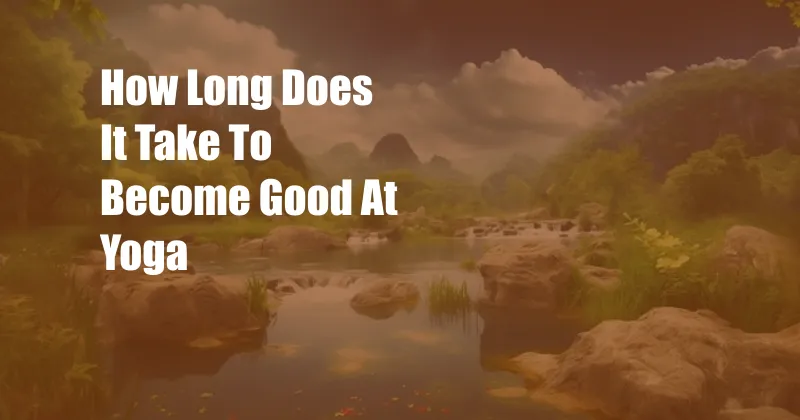
How Long Does It Take to Become Good at Yoga?
The allure of yoga lies in its transformative power, not just for our physical well-being but also for our mental and emotional states. It’s a journey of self-discovery and growth that can leave you feeling empowered, balanced, and deeply connected to your true self.
If you’re contemplating embarking on this yogic adventure, you may wonder how long it takes to become proficient at it. While the answer isn’t cut-and-dried, this article delves into the factors that influence your progress and provides an overview of what to expect as you dedicate yourself to this transformative practice.
Defining “Good” in Yoga
Before we dive into the journey, we must define what it means to be “good” at yoga. Is it about effortlessly nailing complex poses or being able to hold your breath indefinitely? The true essence of yoga transcends physical feats and external validation.
Yoga is a personal exploration that fosters a profound connection with yourself and the world around you. It’s about finding balance, both on and off the mat, cultivating mindfulness, and embracing compassion. As you progress, your definition of “good” will evolve, shifting the focus from perfecting poses to embodying the principles of yoga in all aspects of your life.
Factors Influencing Your Progress
The pace at which you progress in yoga is influenced by various factors, including:
- Consistency: Regular practice is key to steady progress. Aim for at least three sessions per week.
- Intensity: The more physically demanding your practice, the faster you may notice changes in flexibility and strength.
- Body Type: Natural flexibility and strength can impact the ease with which you progress in certain poses.
- Injuries: Previous injuries may require modifications and a more gradual approach to practice.
- Age: While yoga is suitable for all ages, the body’s natural changes with age can influence the pace of progress.
The Slow and Steady Path
Becoming proficient in yoga is not a race but a journey of gradual transformation. It takes time to cultivate flexibility, strength, balance, and the mental focus required for advanced poses. Embrace the process, enjoying each step along the way, and don’t compare yourself to others. Just as a seed needs time to grow into a mighty tree, your yoga practice will blossom with patience and dedication.
Initially, you may focus on mastering basic poses and building a strong foundation. Over time, as your body and mind adjust to the practice, you’ll naturally progress to more challenging poses and explore different styles of yoga. Trust the process, and don’t get discouraged if you don’t see immediate results. Consistency and perseverance are the keys to unlocking your full potential.
Tips for Accelerating Your Progress
While there’s no magic formula for becoming an expert yogi overnight, here are some tips to help you accelerate your progress:
- Find an Experienced Teacher: A qualified teacher can provide guidance, correct your form, and offer modifications to suit your individual needs.
- Practice Regularly: Consistency is crucial. Aim for at least three yoga sessions per week.
- Challenge Yourself: Gradually incorporate more challenging poses as your body and mind adapt to the practice.
- Listen to Your Body: Rest when you need to and avoid pushing yourself too hard, especially if you have any injuries.
- Explore Different Styles: Try different yoga styles to find the ones that resonate with you and challenge you in unique ways.
Frequently Asked Questions
Q: How long does it take to be able to do a handstand?
A: The time it takes to master a handstand varies depending on your fitness level, strength, and practice frequency. With regular practice and proper technique, you can expect to progress gradually.
Q: Can I do yoga if I have injuries?
A: Yes, yoga can be beneficial for people with injuries, but it’s essential to work with a qualified teacher who can modify poses and offer alternative options to accommodate your specific needs.
Q: Is it too late to start yoga?
A: It’s never too late to start practicing yoga. While your flexibility and strength may be influenced by your age, the benefits of yoga extend far beyond physicality.
Conclusion
The journey to becoming proficient in yoga is a unique and deeply personal experience. Embrace the process, enjoy each step along the way, and let the transformative power of yoga unfold within you. Remember that the destination is not just about mastering poses but about cultivating a sense of balance, mindfulness, and compassion both on and off the mat.
If you’re genuinely interested in exploring the world of yoga, I highly encourage you to find a qualified teacher, embark on a regular practice, and immerse yourself in the transformative power of this ancient tradition. Are you ready to embark on this transformative journey and unlock the immense benefits of yoga?